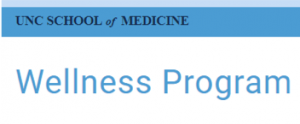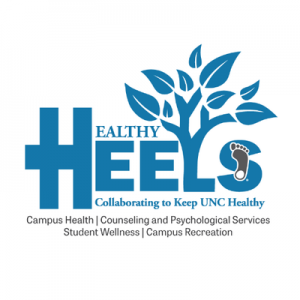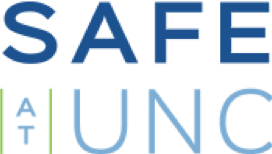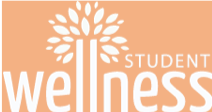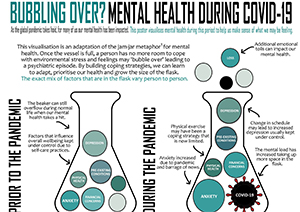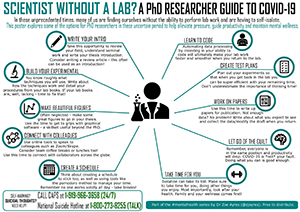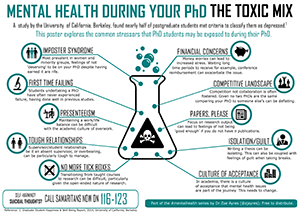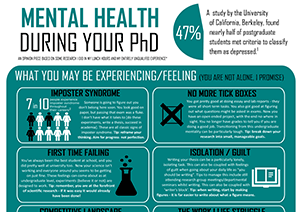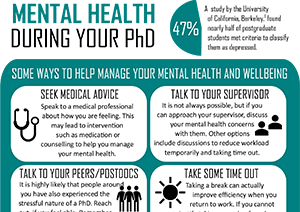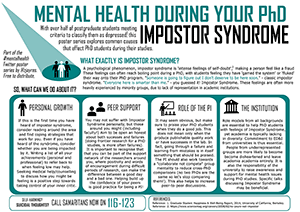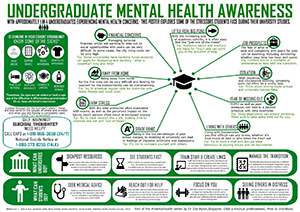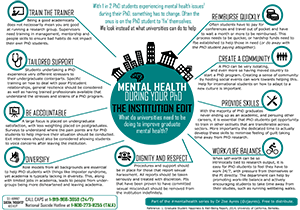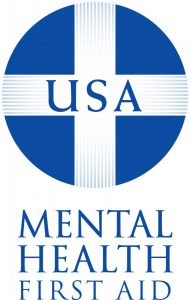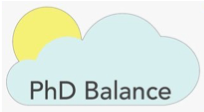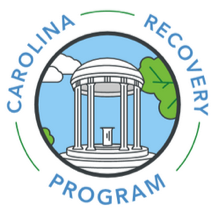Mental Health & Wellness
Emergency Resources
Mental Health Resources during Remote Learning due to COVID-19: Mental health can be a challenge during this global health emergency. These are stressful times and it makes sense to be anxious. There are things you can do to help yourself. Counseling and Psychological Services is open and making appointments via Zoom.
More numbers you can call to talk to a counselor (external to UNC)
- Talkspace – 24/7 access, no appointments or commuting needed, can switch therapists at no extra costs, flexible plans (not instant — need to register)
- BetterHelp – World’s largest counseling service, 100% online, can do messages, chat, phone, video sessions – (not instant — need to register)
- Psychology Today – find a therapist, how to work remotely, and more
- List of Local Resources for Mental Health, Substance Use Disorders & Suicide Prevention (external and within UNC) [pdf]
- APEX Cert – List of Mental Health Resources for Emergencies & Crises, Mobile Crises Services and Coping With COVID-19 [pdf]
For Coronavirus concerns, please visit these resources
- UNC Healthcare Resources for coping with COVID-19
- Other UNC Healthcare COVID-19 resources
- UNC and SOM COVID-19 consolidated resources – on SOM intranet
- Covid-19 FAQs and Resources on the Pharmacology website
- UNC Healthy Heels – recent links to helpful articles and campus resources during and COVID-19
Mental Health Resources
We believe scientists must prioritize mental health and wellbeing in order to be successful. The Department of Pharmacology recognizes and understands that graduate school can bring increased pressure and stress that can be difficult to navigate. Students, faculty, and staff should be aware that we care deeply for everyone in our Pharmacology family and are actively working to promote a healthy environment. With this, the following is a list of UNC-based resources you might wish to explore:
Services/Offices at UNC
- HEELS Care Network: https://care.unc.edu
- The Heels Care Network is a gateway for mental health and wellness resources for everyone on campus: to find a support group, learn strategies for mental health, connect with training and advocacy organizations, or find wellness events on campus. The Heels Care Network also includes support resources for community members who are not doing well and are seeking immediate help.
-
Counseling and Psychological Services (CAPS): https://caps.unc.edu/
- Please note: During remote learning due to COVID-19 Counseling and Psychological Services is open and making appointments via Zoom. The information below is from prior to COVID-19 remote learning. Please visit the website or call and check for updated information.
- First time visits do not need to schedule an appointment and can simply walk in to CAPS during the following days and times:
- Monday-Thursday 9:00 a.m.-12:00 p.m., 1:00 p.m.-4:00 p.m.
- Friday 9:30 a.m.-12:00 p.m., 1:00-4:00 p.m.
- Urgent Needs: Monday-Friday 8:00 a.m.-5:00 p.m.
- CAPS is located in the James A. Taylor Building on the 3rd floor. This building is between Kenan Stadium and the Hospitals, off of Emergency Room Drive. For specific directions from multiple campus locations, see this website: https://caps.unc.edu/about-us/contact-us
- If you know someone in need of CAPS, it is helpful to walk with them to this office. This will not only ensure they reach their destination, but can also help reduce any potential anxiety they may have.
- Initial assessments, brief therapy (if warranted by initial assessment), group therapy, referral management, academic intervention are covered by the health fee and available with no out of pocket cost to eligible students, post-doctoral fellows and partners.
-
Student Wellness Coaches for School of Medicine students: https://www.med.unc.edu/wellness/appointments/
- Amanda Hall, MSW, LCSW, LCASA, Director of Wellness for UNC School of Medicine and Student Wellness Coach
- Amanda is a licensed social worker and provides one-on-one counseling to PhD students at the School of Medicine.
- You can schedule an appointment with Amanda on the BBSP student wellness website.
- Amanda also monitors the wellness of biomedical PhD students and leads Wellness Programming for BBSP students.
- Amanda Hall, MSW, LCSW, LCASA, Director of Wellness for UNC School of Medicine and Student Wellness Coach
-
UNC Healthy Heels: https://healthyheels.org/about/recent-links/
- Healthy Heels provides a variety of useful information to keep healthy created by Campus Health, Student Wellness, Counseling and Psychological Services & Campus Rec. including:
- Links to helpful articles and campus resources including during COVID-19
- A blog listing weekly healthy virtual happenings you can join in on with topics such as:
- Self Care Strategies When the News is Difficult
- free COVID-19 testing events
- cardio workouts, mental challenge games, meditation sessions, intramural fantasy football, rocket league, 1 on 1 training sessions, lots of fitness classes, safe biking around UNC
- global grads, diversity and inclusion, racism and medicine, resumes that standout
- Sign up to follow the blog with your email
- Healthy Heels provides a variety of useful information to keep healthy created by Campus Health, Student Wellness, Counseling and Psychological Services & Campus Rec. including:
-
Graduate Student Orientation Site: https://gradschool.unc.edu/events/orientation/#virtualorientation
- The Graduate Student Orientation site has lots of information and resources, along with videos to introduce those to you
-
Office of the Dean of Students: https://odos.unc.edu/student-support
- The Office of the Dean of Students is committed to providing essential education, programs and services to support students’ academic, personal and professional development. Our staff works with faculty, staff, and students across campus, as well as with parents, town leaders and community members to reach this goal,
-
University Ombuds Office: https://ombuds.unc.edu/
- The University Ombuds Office is a safe place where all Carolina staff, faculty, students and administrators are welcome to come and talk in confidence about any campus issue, problem, or dispute. Our office supplements, but does not replace, the University’s formal channels, such as the grievance policy. Contact us as a first step, or as a last resort, or anywhere along the way. Come and share your concerns, evaluate your situation, and plan your next step—if you want to take a next step. Use of our services is voluntary and free. Visitors will find our office a safe place to discuss their concerns, no matter how large or small.
- Ombuds Brochure
-
Safe at UNC: https://safe.unc.edu/
- This website is the main portal for students, faculty, staff, and visitors at UNC- Chapel Hill to obtain information about prevention and help regarding issues of discrimination, harassment, sexual assault or sexual violence, interpersonal violence, and stalking.
-
Equal Opportunity and Compliance Office: https://eoc.unc.edu/
- At Carolina, every member of our campus community is entitled to live, learn, and work in an environment that is inclusive and welcoming. If ever you find that certain events or experiences have unfairly affected your academic or professional success, we’re here to help.
-
Accessibility Resources and Services (ARS): https://ars.unc.edu/
- Through ARS, The University of North Carolina – Chapel Hill seeks to meet the individual needs of applicants and current students with disabilities and medical conditions by coordinating and implementing appropriate accommodations and providing resources and services as they relate to academics, residences, dining and co and extra-curricular campus activities.
- ARS also functions as a source of information, educational outreach and advice, as well as a communication link among individuals with disabilities, faculty and staff, outside agencies, and the community at large.
-
Student Wellness: https://studentwellness.unc.edu/
- Student Wellness is a health education and health promotion office whose work is rooted in Public Health science, with a focus on environmental change strategies.
-
Employee Assistance Program (EAP) (Available to permanent UNC employees and their dependents, including postdocs): https://hr.unc.edu/benefits/work-life/eap/
- From financial pressures to workplace stress and family issues, life can be challenging. If you need help, the UNC-Chapel Hill Employee Assistance Program (EAP) is available. The EAP is a confidential counseling and resource program that is designed to help University employees and their families deal with both personal and work-related concerns.
- Trained counselors are available by phone 24 hours a days, seven days a week through the University’s EAP offered by ComPsych. You or your family members may call the EAP at anytime. Call ComPsych toll-free 24 hours a day at 877-314-5841.
- You can also visit their online resources at www.guidanceresources.com.
- At the home page, click “I am a first-time user”
- At the top of the next page, enter the Organization Web ID TARHEELS and complete the remainder of the boxes with your desired username and password and other requested information
- On subsequent visits, use the username and password you established on your first visit to access resources
Mental Health & Wellness
During Covid-19
-
Bubbling Over? Mental Health During Covid-19
- As the global pandemic takes hold, for many of us our mental health has been impacted. This poster visualizes mental health during this period to help us make sense of what we may be feeling.
Open pdf
(Our thanks to Dr. Zoë Ayres, @ZJAyres, who developed and shared this poster.) - Using the analogy of a beaker, the poster shows how factors that influence our wellbeing such as depression, anxiety, physical health, pre-existing conditions and financial concerns that are usually kept under control during normal times may overflow due to changes caused by Covid-19.
- Tips for how to manage your mental health during Covid-19 include: speak to a professional, focus on what you can control, make time for exercise, create a schedule, communicate with others, productivity comes second, learn something new, let go of the guilt.
- As the global pandemic takes hold, for many of us our mental health has been impacted. This poster visualizes mental health during this period to help us make sense of what we may be feeling.
-
A Scientist Without A Lab? A PhD Researcher Guide to Covid-19
- In these unprecedented times many of us are finding ourselves without the ability to perform lab work and are having to self-isolate. This poster explores some of the options for PhD researchers in this uncertain period to help alleviate pressure, guide productivity and maintain mental wellness.
Open pdf
(Our thanks to Dr. Zoë Ayres, @ZJAyres, who developed and shared this poster.) - Things to do described on the aposter: write your thesis intro, build your experimental techniques, make beautiful figures, learn to code, create test plans, work on papers, connect with colleagues, create a schedule, let go of guilt, and take time for you.
- In these unprecedented times many of us are finding ourselves without the ability to perform lab work and are having to self-isolate. This poster explores some of the options for PhD researchers in this uncertain period to help alleviate pressure, guide productivity and maintain mental wellness.
Mental Health & Wellness
During PhD and After
For Graduate Students
-
The Toxic Mix During Your PhD:
- The stressors & the strains…what might make management of your mental health more difficult.
Open pdf
(Our thanks to Dr. Zoë Ayres, @ZJAyres, who developed and shared this poster.) - Common stressors discussed on the poster include: imposter syndrome, first time failing, financial concerns, competitive landscape, presennteeism, papers please, tough relationships, isolation/guilt, no more tick boxes, and of acceptance.
- The stressors & the strains…what might make management of your mental health more difficult.
-
Mental Health During Your PhD:
- What you might experience or feel.
Open pdf
(Our thanks to Dr. Zoë Ayres, @ZJAyres, who developed and shared this poster.) - This poster discusses what you may be experiencing/feeling which can include: imposter syndrome, no more tick boxes, first time failing, isolation/guilt, competitive landscape, the work/life struggle.
- It also includes warning signs to be aware of in those around you who may be struggling which include: increased drinking, increased or decreased eating, working long hours, being absent, joking about suicide, and looking disheveled.
- It also includes some ways to manage your mental health and wellbeing such as: seek medical advice, take some time out, focus on you, request counseling, talk to your supervisor, talk to your peers/postdocs, create manageable chunks, and read literature.
- What you might experience or feel.
-
Some Mental Health Tips During Your PhD:
- Some ways to help manage your mental health and wellness.
Open pdf
(Our thanks to Dr. Zoë Ayres, @ZJAyres, who developed and shared this poster.) - The poster’s eight tips for how to manage your mental health during Covid-19 include: seek medical help, talk to your supervisor, talk to your peers/postdocs, focus on you, create manageable chunks, request counseling, read literature.
- Some ways to help manage your mental health and wellness.
-
Shining a Spotlight on Imposter Syndrome:
- What we can do, what our peers can do to support, the role the PI plays, and what universities can do to support.
Open pdf
(Our thanks to Dr. Zoë Ayres, @ZJAyres, who developed and shared this poster.) - This poster discusses imposter syndrome and what we can do about it. Imposter syndrome is ‘intense feelings of self-doubt’, making a person feel like a fraud These feelings can often reach boiling point during a PhD. Things we can do about it include: how to deal with it on a personal level, peer support, role of the PI and the institituion.
- What we can do, what our peers can do to support, the role the PI plays, and what universities can do to support.
For Postdocs
-
The Perils of a Postdoc:
- A foray into the fact that mental health issues do not stop at the PhD level. The strains and stressors continue into the postdoc environment as well.
Open poster
(Our thanks to Dr. Zoë Ayres, @ZJAyres, who developed and shared this poster.) - Common stressors included on the poster are: compete or perish, family commitments, idea generation, need for independence, position instability, teaching experience, global challenges, altac sell-out, a star is born, burnout or drop out, and don’t get stuck.
- A foray into the fact that mental health issues do not stop at the PhD level. The strains and stressors continue into the postdoc environment as well.
For Undergraduates
-
Undergraduate Health Awareness:
- With approximately 1 in 4 undergraduates experiencing health concerns, this poster explores some of the stressors students face during their university studies.
Open poster
(Our thanks to Dr. Zoë Ayres, @ZJAyres, who developed and shared this poster.) - Common stressors students experience during their studies can include: financial concerns, away from home, little fish in a big pond, exam stress, grade panic, living with others, fear of missing out, isolation and job prospects.
- it also includes signs that others around you are struglling, which can include: being absent, slipping grades, social withdrawal, disheveled appearance, poor sleep patterns, increased irritability, changes in appetite and increased drinking.
- Among things students can do are: seek medical advice, reach out for help, focus on you, seeing others in distree.
- Among things institutions can do are: signpost resources so students know what help is availble, see students fast, train staff and create links, and manage the transition.
- With approximately 1 in 4 undergraduates experiencing health concerns, this poster explores some of the stressors students face during their university studies.
For Institutions
-
The Institution Edit:
- What can universities do to improve graduate mental health? What are the active steps to make mental health better for PhD students? The narrative that it’s the students’ problem and their problem only is wrong and misleading.
Open pdf
(Our thanks to Dr. Zoë Ayres, @ZJAyres, who developed and shared this poster.) - The poster explores things universities can do to improve graduates’ mental health, which include: train the trainer, tailor support, be accountable, diversity, dignity and respect, work/life balance, provide skills, create a community, and reimburse quickly.
- What can universities do to improve graduate mental health? What are the active steps to make mental health better for PhD students? The narrative that it’s the students’ problem and their problem only is wrong and misleading.
-
Stress First Aid:
- Stress First Aid
- Stress First Aid 2
- The SOM Wellness group and holds monthly meetings and training that then can be offered to Departments within the SOM.
Training Opportunities
(Open to Students, Postdocs, Faculty, and Staff)
-
Mental Health First Aid Training: http://ssw.unc.edu/sswevents/mhfa-training
- Mental Health First Aid is an 8-hour training that will give students, staff, and faculty the skills to help someone who is developing a mental health problem or experiencing a mental health crisis. Just as CPR training helps a layperson without medical training assist an individual following a heart attack, Mental Health First Aid training helps a layperson assist someone experiencing a mental health crisis.
- HAVEN (Helping Advocates for Violence Ending Now) Training: https://womenscenter.unc.edu/programs/haven-training/
- HAVEN (Helping Advocates for Violence Ending Now) is a collaboration between the Equal Opportunity & Compliance Office, the Carolina Women’s Center, the Office of the Dean of Students, and Student Wellness. It provides students, faculty, staff and postdoctoral fellows with tools to be an ally to someone who has experienced sexual or interpersonal (relationship) violence or stalking. The three-hour training emphasizes the importance of listening, responding compassionately, and connecting survivors to resources on campus and in the community.
Student Groups/Organizations
-
PhD Balance: https://phdbalance.com/
- This organization was founded by current Microbiology and Immunology student, Susanna Harris.
- You can be productive in academia, work on and complete a graduate degree, AND struggle with your mental health. Our mission at PhD Balance is to provide honest stories from people like you and curate resources with advice about strategies, yoga, mindfulness, and more.
-
Carolina Recovery Program: https://studentwellness.unc.edu/programs/alcohol-drug-programs/carolina-recovery-program
- To encourage a community that supports continued recovery, academic excellence, and a commitment to serving the greater UNC community. The Carolina Recovery Program provides each student a customized success plan, staff and peer support, and proactive recovery focused programming. Their goal is to enable students to enjoy a normal substance-free collegiate experience while excelling at UNC-CH. They believe this recovery program experience will reconnect emerging leaders with their passion to make a difference in the world.
-
Stigma Free Carolina: http://stigmafree.unc.edu/
- Stigma Free Carolina is a UNC community campaign aimed at reducing stigma toward mental health concerns and treatment. By accurately defining mental health, educating the community, and dispelling negative or false beliefs about mental health and its treatment we can help everyone be their best selves and reach their full potential.
Additional Resources
- Concerning Behavior Response Guide
- Quick Reference Guide for Incidents of Sexual and Gender-Based Discrimination, Sexual Harassment, Sexual Assault or Sexual Violence, Interpersonal (Relationship) Violence, and Stalking
- Faculty Guide for Mentoring a Student with a Mental Health Issue
- Faculty Guide for Students of Concern
- UNC Mental Health Task Force Report
- “Get online to support wellbeing of graduate students” – eLIFE Article by Susanna L. Harris (M&I Student) and Liesl A. Krause
- Anxiety and stress management training
- Stress and anxiety and meditation and mindfulness resources
- Lecture by Dr. Lori Carter-Edwards on Pharmacogenetics, Personalized Medicine, and Race: Understanding Implicit Bias, including a list of reading materials referenced by the lecture



